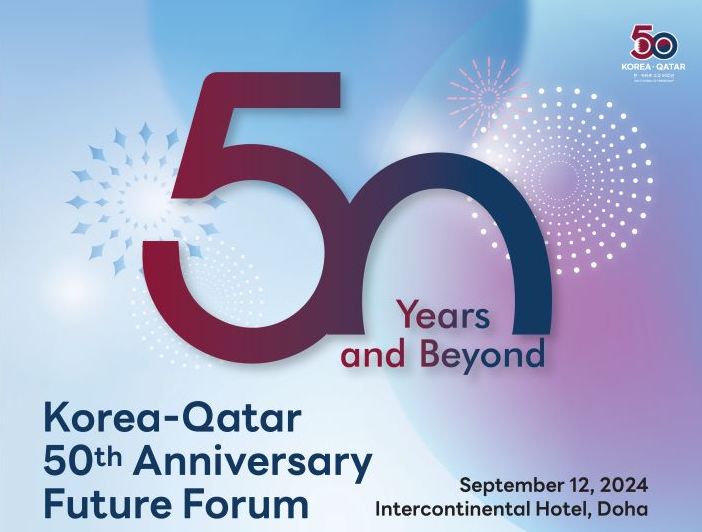Official relations between South Korea and Qatar began in 1974, with Doha’s embassy opening in Seoul in 1992.
Qatar and South Korea celebrated half a century of friendship at the Korea-Qatar 50th Anniversary Future Forum in Doha.
Under the theme “50 Years and On”, the event on Thursday featured presentations from scholars on Qatari-Korean relations and video screenings showcasing South Korean culture.
Organised by the Republic of Korea’s mission in Qatar, the forum marked a series of cultural and educational events commemorating the longstanding relationship. Official ties were established in 1974, with Qatar opening its embassy in Seoul in 1992.
In his opening remarks, South Korean Ambassador to Qatar Yun Hyunsoo highlighted how five decades of collaboration have set the stage for future advancements in their partnership.
“Fifty years ago, Korea and Qatar were distant countries with little connection. However, over the years, the two nations have forged a remarkable partnership within decades,” he said.
The ambassador, who was appointed this year, also reflected upon Qatar’s role as a critical energy partner to South Korea, recalling Qatar’s exports of almost 10 million tonnes of energy a year to the east Asian country, making it South Korea’s largest the largest LNG supplier.
“Last year, the trade volume between Korea and Qatar reached $15.7bn, marking a 4,000-fold increase compared to 50 years ago,” the ambassador said.
During South Korea’s President Yoon Suk Yeol visit to the Gulf state for the first time last year, the relationship between the two nations was elevated to a Comprehensive Strategic Partnership.
“This marks a new era – one filled with possibilities, potentials, and the promise of lasting progress together. Through this new partnership, the two countries now work towards closer consultation and have further deepened coordination on policy issues of mutual interest,” Yun Hyunsoo said.
South Korea and Qatar are now collaborating in fields such as renewable energy, smart-agriculture, ICT, health, shipping, culture, and human exchange, he added.
Landmark projects
South Korea has made a significant mark on Qatar’s skyline and infrastructure, beginning with the early 1980s construction of the Sheraton Grand Doha Resort & Convention Hotel by Hyundai Engineering and Construction, a subsidiary of Hyundai Motor Company. This landmark was Hyundai’s first project in Qatar and set the stage for extensive South Korean involvement in the country.
To date, South Korean firms have participated in over 130 construction and infrastructure projects in Qatar, including the National Museum of Qatar.
A Hyundai representative told Doha News that these landmark projects – such as the Lusail Towers, Sabah al Ahmad Corridor, and various ventures with Hamad Medical Corporation – underscore the strong bilateral ties between the two nations.
“Hyundai and Samsung have kind of maintained the longest consistent relationship with the country and there they’ve continued their presence in Qatar,” the representative told Doha News. “Qatar is one of the most important countries for the head office in South Korea to keep our branch office active till now.”
Similar foreign policies
In May, Qatar and South Korea marked 50 years of diplomatic relations with a two-day cultural festival at Mall of Qatar. The “Unveil Korea!” event offered Qataris a chance to explore South Korean tourism, culture, and medical services, featuring K-pop performances and diverse South Korean cuisine.
In June, the Qatari embassy in Seoul, in partnership with The Korea Times (KT), launched a photography exhibition showcasing 21 images by KT’s Wonsuk Choi, alongside works from Qatari photographers Abdulla Hamdan Al Mannai and Yousuf Mubarak Al Dosari.
South Korea’s mission in Qatar organised a photo contest to celebrate the anniversary, which concluded on Thursday.
According to Dr. Soojin Lee, a lecturer in Middle East and African Studies at Hankuk University of Foreign Studies and a speaker at the Korea-Qatar 50th Anniversary Future Forum, South Korea and Qatar share similar foreign policy strategies, particularly in mediation efforts and balancing relations among regional powers.
Lee explained to Doha News that both nations face significant geopolitical pressures: “South Korea is surrounded by major powers like China, Japan, and Russia, placing it at a crossroads of conflict,” she said.
“In the case of the Middle East, Qatar has found itself in a similar position. The two nations could benefit from sharing knowledge on mediation and keeping the balance.”
Regarding future collaboration, Lee suggested expanding educational exchange programmes as a promising avenue.
“Making a stable and consistent cooperation based on governmental support will be very important for the future,” the MENA studies professor said.
In her presentation, “50 Years Together: Building the Future of Economic and Security Cooperation between Korea and Qatar,” Lee highlighted collaborative efforts to address mutual challenges, such as grain self-sufficiency. She emphasised their joint initiatives in smart agriculture through various committees and research centres.
Lee also noted the need to increase awareness of Qatar among her Korean students, who often focus on more widely recognised Middle Eastern countries like Egypt.
“I try to broaden their understanding of Qatar by drawing parallels with traditional areas in Korea, such as Msheireb,” she said. “My goal is to spark Korean students’ interest in Qatar, much like the curiosity Qatari students have about Korea.”







